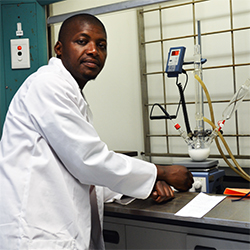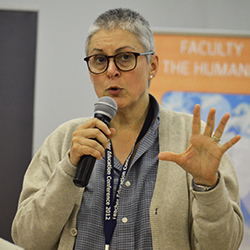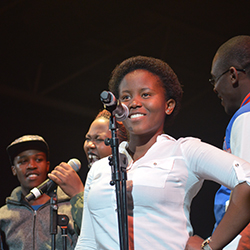
Dr Lehlohonolo Koao believes his research
will improve ordinary lives.
Photo: Thabo Kessah

Prof Lis Lange making a point about
the governance, leadership, and
management processes at the university.
Photo: Thabo Kessah

One of the leading performers of
I-DENT-I-TIES, Baanetse Mokhotla.
Photo: Thabo Kessah
The year 2016 has seen the Qwaqwa Campus become a hive of activity from all fronts.
Lithium-ion batteries research
On the research front, Dr Lehlohonolo Koao started work on the research that is aimed at improving lives of ordinary people. His research project focuses on improving the efficiency of lithium-ion batteries that are now commonly used in portable electronics, such as cellphones and laptops.
“This study will enhance power retention in the batteries for improved daily life since cellphones, solar panels, and laptops, to mention only a few, are now a way of life.’’
Dr Koao is a Senior Lecturer in the Department of Physics, where he specialises in solid state materials. He is also a member of the Vice-Chancellor’s Prestige Scholars Programme.
Spotlight on the academic project
To create a conducive teaching and learning environment on the campus amid the academic difficulties experienced during the year, the Institute for Reconciliation and Social Justice (IRSJ) hosted a critical conversation that was facilitated by Vice-Rector: Academic, Prof Lis Lange.
Prof Lange interacted with students who asked her very difficult, but critical questions relating to internal UFS processes aimed at academic excellence. Issues that were discussed included developing a common understanding on governance, leadership, and management processes at the university.
Student talent unearthed
This was a year during which massive student talent was unearthed by an unusual stage play called I-DENT-I-TIES. This large-scale interdisciplinary performance project afforded Qwaqwa students an unforgettable experience. This was according to Baanetse Mokhotla, one of the leading performers.
“I have personally learnt a lot about performing arts and also grew as an individual.”
The creative minds behind the play included New York-based Dutch director, Erwin Maas; Vienna-based Dutch theatre designer, Nico de Rooij; Djana Covic, a Serbian performance-craft-artist based in Vienna; and South African film and stage legend Jerry Mofokeng. The production was part of this year’s Vrystaat Arts Festival in Bloemfontein.